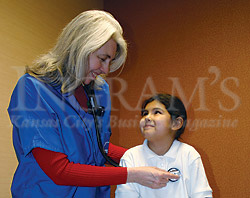Family Health Center Serves Patients, Community
by Matt Ehrhorn

At first glance, the metallic building on the corner of Southwest and Rainbow Boulevards looks like it could be part of the surrounding industrial complex. But, on closer inspection, the building—with tall windows facing the street and a colorful, abstract art structure mounted out front—doesn’t exactly fit in with the gray domed—shaped silos and towering grain elevators behind it.
In fact, Southwest Boulevard Family Health Care (FHC) has been undergoing major renovations since 2003 to triple its modest size from a former service station to a larger, comprehensive non-profit medical facility. Started in 1989 by Medical Director Sharon Lee, M.D., FHC provides health care and numerous other services to a large portion of residents in Wyandotte County and the surrounding Kansas City, Kansas and Missouri area.
With renovations, furniture and medical equipment funded entirely by corporations and foundations such as the Hall Family and the Speas Foundation, the clinic is operated by a small staff of nineteen full- and part-time people and a daily mix of volunteer physicians, medical students and other professionals. Every Monday and Wednesday evening, walk-in patients are treated in the JayDoc Free Clinic, which was set up two years ago by University of Kansas Medical School students. FHC receives 8,500 to 10,000 patient visits annually and has supplied over a quarter of a million dollars a year in non-reimbursed charity care since its inception.
The majority of patients treated at Family Health Care are medically underserved, poor or homeless. Over half of them have no insurance, and about 60 percent of the people living in neighborhoods regularly served by the clinic live at or below 200 percent of federal poverty levels, making them eligible for FHC’s sliding fee scale. With Medicaid restrictions increasing and more people, with and without jobs, losing their insurance benefits, one of Dr. Lee’s main concerns is getting one-time patients regular treatment. “We’re working all the time to assist the growing number of patients,” she says, “[but] it’s not just our care—how do we get them the medication they need?”
Besides health care treatment, FHC’s ongoing $2 million renovations have made it possible for the clinic to accommodate a number of community health and education programs. Parents with terminal illnesses can set up custodial arrangements for their children through the clinic’s Permanency Planning Project. The HIV University, the M.E.N.S. Group, the Older Adults Outreach and the national HIV Wisdom for Older Women are all projects designed to educate men and women afflicted with or affected by HIV. FHC currently treats 500 HIV/AIDS patients, roughly a third of the area’s population with HIV/AIDS.

Dr. Lee checks the heartbeat of six-year-old patient Maia Madrigal.
Other current FHC projects include the Hepatitis C Project, the Healthy Weight Project’s “Fit for Life” program and two programs that address illiteracy issues in the area. KC Reads works with Kansas City’s Reach Out and Read program to supply children with books, and the Adult Literacy Project is a GED assistance course that utilizes volunteer teachers and an online GED programming computer lab that is scheduled to be up and running by this spring.
One significant addition to the F.H.C. clinic is an auditorium next to the lobby that is used for such diverse community activities as aerobics and karate classes, weddings, after-funeral receptions and Quinceaneras, or “coming-out parties,” for young Mexican and Latin American women. Dr. Lee displays understandable pride with FHC’s role in the community. Beyond treating patients, she recognizes the importance of “having a place for individuals and families in the community to come and do things together.”
The number of uninsured, poor and homeless in our society may be rising disproportionately to the availability of Medicaid and other healthcare treatments, but it is encouraging that devoted people and organizations like Southwest Boulevard Family Health Care are ready to take the challenge of meeting and treating this growing need in our community.